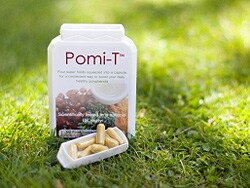Food Supplement Linked to Lower PSA in Prostate Cancer:
CHICAGO, Illinois — A commercially available food supplement that contains pomegranate, broccoli, green tea, and turmeric significantly lowers prostate-specific antigen (PSA) levels, compared with placebo, in patients with prostate cancer, a double-blind placebo-controlled randomized trial has shown.
|
Pomi-T (nature Medical Products) |
The study results, presented here at the 2013 Annual Meeting of the American Society of Clinical Oncology (ASCO®), made headlines around the world and caused the polyphenol-rich supplement, known asPomi-T (nature Medical Products), to sell out within hours.
This is a "promising new therapy," said Tomasz Beer, MD, professor of medicine and director of the prostate cancer research program at the Oregon Health and Science University in Portland, during a "highlights of the day" session.
"We have been staggered by the level of interest...from medical professionals and the public," Marcus Williams, owner and director of nature Medical Products, told Medscape Medical News. As soon as the results of this study were released, the company, based in Porthcawl, South Wales, United Kingdom, received a rush of orders from customers in Australia, Canada, the United Kingdom, and the United States.
"It's awesome," the study's lead investigator, Robert Thomas, MD, a consultant oncologist at Bedford Hospital and Addenbrooke's Hospital, in the United Kingdom, told Medscape Medical News.
"We didn't expect such a big response. People are seeing that this can change practice...because men and their doctors do look at their PSA as a deciding factor in whether to stop active management," he explained.
Significantly Different Than Placebo
The study involved 203 men (average age, 74 years) with a PSA relapse after radiotherapy or surgery for localized prostate cancer. The men, who were being managed with active surveillance, were randomized to receive the supplement 3 times a day for 6 months or placebo.
At 6-month follow-up, the median increase in PSA was 63.8% lower in the supplement groups than in the placebo group (14.7% vs 78.5; P =.0008). In addition, PSA levels were stable or lower than baseline more often in the supplement group (46% vs 14%; P = .00001).
Fewer men in the supplement group than in the placebo group went on to receive brachytherapy, radiotherapy, surgery, or androgen-deprivation therapy (7.4% vs 26.0%; P = 0.01).
At the end of the study, more men in the supplement group than in the placebo group continued on active surveillance (92.6% vs 74.0%). "This is an end point we feel is important: more men were choosing to stay on treatments with less toxicity," Dr. Thomas noted.
There were no differences between the supplement and placebo groups for baseline and serial measurements of cholesterol, blood pressure, serum glucose, C-reactive protein, or adverse events.
"Pomi-T was well tolerated," he said. "More men experienced nonsignificant bloating or diarrhea, but 15% of men reported beneficial effects, including better digestion and improvement of urinary symptoms."
Previous research has shown that the polyphenols and antioxidants in pomegranate, broccoli, green tea, and turmeric have individual anticancer properties, but "we believe there's a synergistic effect in the supplement," said Dr. Thomas.
In addition, the fact that each ingredient originates from a separate food category (fruit, vegetable, herb, and spice) might prevent potential adverse effects from the overconsumption of one particular type of polyphenol, he noted.
In the lab, polyphenols have been shown to have antiproliferative, antiangiogenic, proadhesion, antimetastatic, and proapoptotic properties, and notably, they have no phytoestrogenic or hormonal effects. "We specifically chose to steer away from anything that might have a hormonal effect."
Because of the supplement's effect is likely not hormonal, future trials will involve men with different stages of prostate cancer and those receiving androgen-deprivation therapy, he said. In addition, the researchers hope to look at the impact of the supplement on other slow-growing cancers and even on cancer prevention.
The study received no funding from the manufacturer of the supplement; however, the company worked very closely with the research team to develop the product, said Williams. "Unlike other nutritional supplement products, the manufacture of this supplement was significantly more time-consuming because Dr. Thomas and colleagues, for whom this was initially made, insisted on a great deal of quality assurance, over and above that normally required by the US Food and Drug Administration or European Commission, particularly in terms of purity and authenticity."
He said the study signals "a new era for the nutritional supplement industry, which has previously relied on advertising and marketing rather than evidence of benefit. Clearly, it's the latter that the public wants."
Dr. Beer noted that the product's significant effect on adherence to active surveillance is "potentially clinically meaningful... If this can be confirmed, this is really interesting," he said, although he added that "these patients were more severe than the sort of patients that we would follow [with active surveillance] here in the United States."
Prostate Cancer UK reacted more cautiously to the news, releasing a statment saying that "there is not yet enough evidence that Pomi-T food supplements have a significant impact."
Kate Holmes, MD, head of research at Prostate Cancer UK, said in a statement that "there is increasing evidence showing that men who have a healthy lifestyle, including a balanced diet and regular exercise, have better prostate cancer outcomes than those who do not. At this stage, however, we simply do not have enough evidence to suggest that any particular foods or supplements have a significant impact and these should certainly not be substituted for conventional treatments."
"We would not encourage any man with prostate cancer to start taking Pomi-T food supplements on the basis of this research. Anyone with any concerns about prostate cancer should discuss them with their doctor or call Prostate Cancer UK's helpline," she added.
The authors have disclosed no relevant financial relationships.
In best of health,
Dr. Shawnie
www.drshawnie.com
918.249.1535
'via Blog this'

